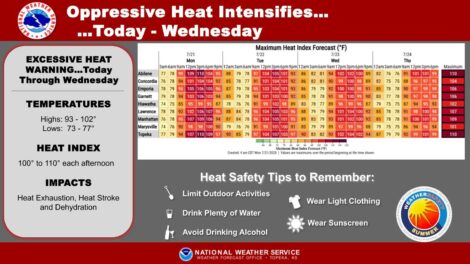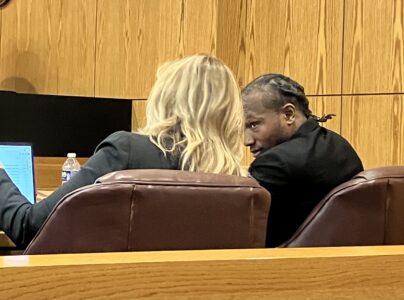For public misconduct, DA Valdez deserves public censure at a minimum, special prosecutor argues

photo by: Chris Conde/Journal-World
Douglas County District Attorney Suzanne Valdez, left, Deputy District Attorney Joshua Seiden, and attorney Steven Angermayer are pictured Tuesday, Dec. 19, 2023, outside the hearing room at the Kansas Judicial Center in Topeka, where Valdez was attending her disciplinary hearing. No cameras were allowed inside the hearing room.
A public wrong deserves a public punishment, a special prosecutor is arguing in the disciplinary case of Douglas County District Attorney Suzanne Valdez.
An informal admonition is not enough to address the professional misconduct of Valdez, Special Prosecutor Kimberly Bonifas has argued to the Kansas Supreme Court in a brief filed this week and released Tuesday. Bonifas argues that such a penalty has already been rejected twice in the disciplinary hearing process.
Bonifas, who argued Valdez’s case to the Kansas Board for Discipline of Attorneys last year, writes in her response to Valdez’s recent plea for leniency that a published censure “is the minimally appropriate discipline for (Valdez’s) publicly published misconduct.”
Valdez, as the Journal-World reported last month, has asked the court for an informal admonition only, arguing in part that she has already been “severely punished” by media coverage of her case, which she blamed for her election loss in August. Valdez’s attorney, Stephen Angermayer, wrote that Valdez’s professional reputation would “continue to be harmed and it may be difficult for (her) to pursue other professional opportunities if a formal censure is ordered.”
A panel for the Kansas Board for Discipline of Attorneys unanimously recommended in April, after a three-day hearing the previous December, that the Kansas Supreme Court publicly censure Valdez for two incidents of “undignified or discourteous conduct” toward Douglas County Chief Judge James McCabria in 2021, shortly after Valdez took office.
Valdez, who was elected in 2020, was critical of the Douglas County District Court’s COVID-19 measures and issued a press release accusing McCabria of making false statements, as well as a social media post alluding to him as an “insecure man” — behavior that shocked local judges, as they testified to the panel. The hearing panel ultimately concluded that Valdez’s behavior violated a rule of professional conduct that prohibits undignified or discourteous conduct that is degrading to a tribunal. It determined that Bonifas had not met the “clear and convincing” burden of proof with respect to three other allegations, however.
Though Bonifas had requested that Valdez lose her law license for a year, the panel recommended that Valdez be censured and that the censure be published in the Kansas Reports.
In her response to Valdez’s plea for leniency, Bonifas indicates that Valdez’s allegations regarding the media “are improper,” as are references to “assertions” related to events that occurred after the disciplinary hearing, such as the election.
“Respondent also blames the media (but not her own misconduct) for damaging her reputation following the disciplinary hearing,” Bonifas writes, arguing that the only issue properly before the Supreme Court when it hears the case next year is not any finding of fact or conclusion of law, but simply the nature of the discipline to be handed down.
Dozens of paragraphs in Valdez’s brief are simply her “own version of events, none of which were found as facts by the Hearing Panel,” and those should be stricken from the court’s consideration, Bonifas writes.
In arguing for public censure at a minimum, Bonifas writes that “the nature of the discipline should match the nature of the violations and be visible to those to whom the Respondent’s duty was violated.” Bonifas notes in her brief that the panel found that Valdez’s comments about McCabria would have been inappropriate in even a private setting, let alone the public setting in which they occurred.
“Respondent’s conduct wasn’t privately done,” she writes, “but rather she wrote things to the public in the news and on the Internet, with unlimited viewing. Those harmed and affected should be given the opportunity to view this Court’s published opinion and corrective discipline.”
Bonifas argues that Valdez’s publicly critical statements about McCabria — which Valdez said she regrets but does not find unethical — were not heat-of-the-moment utterances but were “calculated statements made after some reflection,” at a time when the court “was trying to build public confidence in its ability to cope with an unprecedented condition.”
In her plea for leniency Valdez, 55, indicated that she “no longer desires or intends to serve as a prosecutor or to seek public office.”
Her term will expire in mid-January, when fellow Democrat Dakota Loomis will be sworn in as the county’s new DA.







